
Overman Committee
Encyclopedia
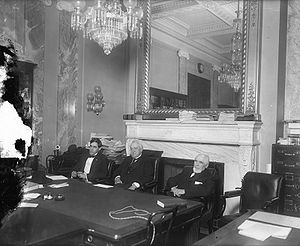
United States Congressional subcommittee
A congressional subcommittee in the United States Congress is a subdivision of a United States congressional committee that considers specified matters and reports back to the full committee....
of the United States Senate
United States Senate
The United States Senate is the upper house of the bicameral legislature of the United States, and together with the United States House of Representatives comprises the United States Congress. The composition and powers of the Senate are established in Article One of the U.S. Constitution. Each...
Committee on the Judiciary chaired by North Carolina
North Carolina
North Carolina is a state located in the southeastern United States. The state borders South Carolina and Georgia to the south, Tennessee to the west and Virginia to the north. North Carolina contains 100 counties. Its capital is Raleigh, and its largest city is Charlotte...
Democrat
Democratic Party (United States)
The Democratic Party is one of two major contemporary political parties in the United States, along with the Republican Party. The party's socially liberal and progressive platform is largely considered center-left in the U.S. political spectrum. The party has the lengthiest record of continuous...
Lee Slater Overman
Lee Slater Overman
Lee Slater Overman was a Democratic U.S. senator from the state of North Carolina between 1903 and 1930. He was born in Salisbury, N.C., the son of William H. and Mary E. Slater Overman. He attended Trinity College , Class of 1874, where he was a member of the Chi Phi Fraternity...
. Between September 1918 and June 1919, it investigated German and Bolshevik elements in the United States. It was an early forerunner of the better known House Un-American Activities Committee
House Un-American Activities Committee
The House Committee on Un-American Activities or House Un-American Activities Committee was an investigative committee of the United States House of Representatives. In 1969, the House changed the committee's name to "House Committee on Internal Security"...
, and represented the first congressional committee investigation of communism.
The Committee's final report was released in June 1919. It reported on German propaganda
Propaganda
Propaganda is a form of communication that is aimed at influencing the attitude of a community toward some cause or position so as to benefit oneself or one's group....
, Bolshevism, and other "un-American activities" in the United States and on likely effects of communism's implementation in the United States. It described German, but not communist, propaganda efforts. The Committee's report and hearings were instrumental in fostering anti-Bolshevik opinion.
Background
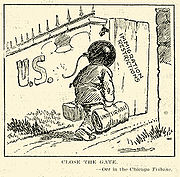
German Empire
The German Empire refers to Germany during the "Second Reich" period from the unification of Germany and proclamation of Wilhelm I as German Emperor on 18 January 1871, to 1918, when it became a federal republic after defeat in World War I and the abdication of the Emperor, Wilhelm II.The German...
, raised concern about the German threat to the United States. The Espionage Act of 1917
Espionage Act of 1917
The Espionage Act of 1917 is a United States federal law passed on June 15, 1917, shortly after the U.S. entry into World War I. It has been amended numerous times over the years. It was originally found in Title 50 of the U.S. Code but is now found under Title 18, Crime...
and the Sedition Act of 1918
Sedition Act of 1918
The Sedition Act of 1918 was an Act of the United States Congress that extended the Espionage Act of 1917 to cover a broader range of offenses, notably speech and the expression of opinion that cast the government or the war effort in a negative light or interfered with the sale of government bonds...
were passed in response.
In the Russian Revolution of 1917 the Bolshevik
Bolshevik
The Bolsheviks, originally also Bolshevists , derived from bol'shinstvo, "majority") were a faction of the Marxist Russian Social Democratic Labour Party which split apart from the Menshevik faction at the Second Party Congress in 1903....
party, led by Vladimir Lenin
Vladimir Lenin
Vladimir Ilyich Lenin was a Russian Marxist revolutionary and communist politician who led the October Revolution of 1917. As leader of the Bolsheviks, he headed the Soviet state during its initial years , as it fought to establish control of Russia in the Russian Civil War and worked to create a...
, overthrew the Russian monarchy and instituted Marxism-Leninism
Marxism-Leninism
Marxism–Leninism is a communist ideology, officially based upon the theories of Marxism and Vladimir Lenin, that promotes the development and creation of a international communist society through the leadership of a vanguard party over a revolutionary socialist state that represents a dictatorship...
. Many Americans were worried about the revolution's ideas infiltrating the United States, a phenomenon later named the Red Scare
First Red Scare
In American history, the First Red Scare of 1919–1920 was marked by a widespread fear of Bolshevism and anarchism. Concerns over the effects of radical political agitation in American society and alleged spread in the American labor movement fueled the paranoia that defined the period.The First Red...
of 1919-20.
The Overman Committee was formally an ad-hoc subcommittee of the Senate Committee on the Judiciary, but had no formal name. It was chaired by Senator Lee Slater Overman and also included Senators Knute Nelson
Knute Nelson
Knute Nelson was an Norwegian American politician. A Republican, he served in the Wisconsin Legislature and Minnesota Legislature, in the U.S. House of Representatives, as the 12th Governor of Minnesota, and as a U.S...
of Minnesota, Thomas Sterling
Thomas Sterling
Thomas Sterling was an American politician. A Republican, he served in the United States Senate from 1913 to 1925.-Early life:Sterling, , was born near Amanda, Ohio...
of South Dakota, William H. King
William H. King
William Henry King was an American lawyer, politician, and jurist from Salt Lake City, Utah. A Democrat, he represented Utah in the United States Senate from 1917 until 1941.-Life:...
of Utah, and Josiah O. Wolcott
Josiah O. Wolcott
Josiah Oliver Wolcott was an American lawyer, politician and judge, from Dover, in Kent County, Delaware. He was a member of the Democratic Party, who served as Attorney General of Delaware, U.S...
of Delaware.
Initial investigation
The Committee was authorized by Senate Resolution 307 on September 19, 1918 to investigate charges against the United States Brewers Association (USBA) and allied interests. Brewing institutions had been largely founded by German immigrants in the mid-19th century, who brought with them knowledge and techniques for brewing beer. The Committee interpreted this mission to mean a general probe into German propaganda and pro-German activities in the United States. Hearings were mandated after A. Mitchell Palmer, the federal government's Alien Property CustodianAlien Property Custodian
An Alien Property Custodian was an office within the Government of the United States during World War I and again during World War II, serving as a Custodian of Enemy Property to property that belonged to US enemies.-World War I:...
responsible for German-owned property in the U.S., testified in September 1918 that the USBA and the rest of the overwhelmingly German liquor industry harbored pro-German sentiments. He stated that "German brewers of America, in association with the United States Brewers' Association" had attempted "to buy a great newspaper" and "control the government of State and Nation", had generally been "unpatriotic", and had "pro-German sympathies".
Hearings began September 27, 1918, shortly before the end of World War I
World War I
World War I , which was predominantly called the World War or the Great War from its occurrence until 1939, and the First World War or World War I thereafter, was a major war centred in Europe that began on 28 July 1914 and lasted until 11 November 1918...
. Nearly four dozen witnesses testified. Many were agents of the Bureau of Investigations (BOI), the predecessor of the Federal Bureau of Investigation
Federal Bureau of Investigation
The Federal Bureau of Investigation is an agency of the United States Department of Justice that serves as both a federal criminal investigative body and an internal intelligence agency . The FBI has investigative jurisdiction over violations of more than 200 categories of federal crime...
(FBI). The agents, controversially and usually erroneously, implicated high-profile American citizens as pro-German, using the fallacy of guilt by association
Association fallacy
An association fallacy is an inductive informal fallacy of the type hasty generalization or red herring which asserts that qualities of one thing are inherently qualities of another, merely by an irrelevant association. The two types are sometimes referred to as guilt by association and honor by...
. For example, the Bureau chief labeled some people pro-German because they had insubstantial and non-ideological acquaintance with German agents. Others were accused because their names were discovered in the notebooks of suspected German agents, of whom they had never heard.
Many attacked the BOI's actions. The Committee heard testimony that it had not conducted basic background checks of the accused and had not read source material it presented to the Committee. Committee members criticized its testimony as "purely hearsay".
Expansion of investigation
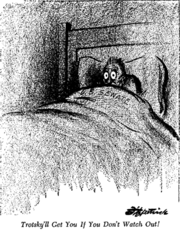
Thomas J. Walsh
Thomas James Walsh was a lawyer and Democratic Party politician from Helena, Montana, in the United States.-Background:...
's Senate Resolution 439, expanding the Committee's investigations to include "any efforts being made to propagate in this country the principles of any party exercising or claiming to exercise any authority in Russia" and "any effort to incite the overthrow of the Government of this country". This decision followed months of sensational daily press coverage of revolutionary events abroad and Bolshevik meetings and events in the United States, which increased anti-radical public opinion. Reports that some of these meetings were attended by Congressmen caused further outrage. One meeting in particular, held at the Poli Theater in Washington, DC, was widely controversial because of a speech given by Albert Rhys Williams
Albert Rhys Williams
Albert Rhys Williams , American journalist, labor organizer and publicist. Wrote memoirs about the October Revolution of 1917 in Russia which he has been both witness and participant.- Biography :...
, a popular Congregationalist minister, who allegedly said, "America sooner or later is going to accept the Soviet Government."
Archibald E. Stevenson
Archibald E. Stevenson
Archibald E. Stevenson was an American attorney and legislative researcher. Stevenson is best remembered for his work as Assistant Counsel of the Lusk Committee of the New York State Senate from 1919 to 1920, the activities of which led to a series of sensational raids and trials of self-professed...
, a New York attorney with ties to the Justice Department, likely a "volunteer spy", testified on January 22, 1919, during the German phase of the subcommittee's work. He said that anti-war
Anti-war
An anti-war movement is a social movement, usually in opposition to a particular nation's decision to start or carry on an armed conflict, unconditional of a maybe-existing just cause. The term can also refer to pacifism, which is the opposition to all use of military force during conflicts. Many...
and anti-draft
Conscription
Conscription is the compulsory enlistment of people in some sort of national service, most often military service. Conscription dates back to antiquity and continues in some countries to the present day under various names...
activism
Activism
Activism consists of intentional efforts to bring about social, political, economic, or environmental change. Activism can take a wide range of forms from writing letters to newspapers or politicians, political campaigning, economic activism such as boycotts or preferentially patronizing...
during World War I, which he described as "pro-German" activity, had now transformed into propaganda "developing sympathy for the Bolshevik movement.". The United States' wartime enemy, though defeated, had exported an ideology that ruled Russia and threatened America anew. "The Bolsheviki movement is a branch of the revolutionary socialism of Germany. It had its origin in the philosophy of Marx and its leaders were Germans." He cited the propaganda efforts of John Reed and gave many examples from the foreign press. He told the Senators, "We have found money coming into this country from Russia." Stevenson has been described by historian Regin Schmidt as a "driving force" behind the growth of anti-Bolshevism in the United States.
The final catalyst for the expansion of the investigation was the Seattle General Strike, which began the day before the Senate passed Resolution 439. This confluence of events led members of Congress to believe that the alleged German-Bolshevist link and Bolshevist threat to the United States were real.
Bolshevism hearings
The Overman Committee's hearings on Bolshevism lasted from February 11 to March 10, 1919. More than two dozen witnesses were interviewed. About two-thirds were violently anti-Bolshevik and advocated for military intervention in Russia. Some were refugees of the Russian DiasporaRussian diaspora
The term Russian diaspora refers to the global community of ethnic Russians, usually more specifically those who maintain some kind of connection, even if ephemeral, to the land of their ancestors and maintain their feeling of Russian national identity within a local community.The term "Russian...
—many former government officials—who left Russia because of Bolshevism. The overriding theme was the social chaos the Revolution had brought, but three sub-themes were also frequent: anti-Americanism among American intelligentsia, the relationship between Jews
Jews
The Jews , also known as the Jewish people, are a nation and ethnoreligious group originating in the Israelites or Hebrews of the Ancient Near East. The Jewish ethnicity, nationality, and religion are strongly interrelated, as Judaism is the traditional faith of the Jewish nation...
and Communist Russia, and the "nationalization" of women after the Soviet revolution.
Stevenson produced a list of 200—later reduced to 62—alleged communist professors in the United States. Like lists of names provided during the German propaganda hearings, this list provoked an outcry. Stevenson declared universities to be breeding grounds of sedition
Sedition
In law, sedition is overt conduct, such as speech and organization, that is deemed by the legal authority to tend toward insurrection against the established order. Sedition often includes subversion of a constitution and incitement of discontent to lawful authority. Sedition may include any...
, and that institutions of higher learning were "festering masses of pure atheism
Atheism
Atheism is, in a broad sense, the rejection of belief in the existence of deities. In a narrower sense, atheism is specifically the position that there are no deities...
" and "the grossest kind of materialism
Materialism
In philosophy, the theory of materialism holds that the only thing that exists is matter; that all things are composed of material and all phenomena are the result of material interactions. In other words, matter is the only substance...
". Ambassador to Russia David R. Francis
David R. Francis
David Rowland Francis was an American politician. He served in various positions including Mayor of Saint Louis, the 27th Governor of Missouri, and United States Secretary of the Interior. He was the U.S. Ambassador to Russia between 1916 and 1917, during the Russian Revolution of 1917...
stated that the Bolsheviks were killing everybody "who wears a white collar
Clerical collar
A clerical collar is an item of Christian clerical clothing. It is a detachable collar that buttons onto a clergy shirt or rabbat , being fastened by two metal studs, one attached at the front and one at the back to hold the collar to the shirt. The collar closes at the back of the neck, presenting...
or who is educated and who is not a Bolshevik."
Another recurring theme at the hearings was the relationship between Jews and communists in Russia
Jewish Bolshevism
Jewish Bolshevism, Judeo-Bolshevism, and known as Żydokomuna in Poland, is an antisemitic stereotype based on the claim that Jews have been the driving force behind or are disproportionately involved in the modern Communist movement, or sometimes more specifically Russian Bolshevism.The expression...
. One Methodist preacher stated that nineteen out of twenty communists were Jews; others said the Red Army
Red Army
The Workers' and Peasants' Red Army started out as the Soviet Union's revolutionary communist combat groups during the Russian Civil War of 1918-1922. It grew into the national army of the Soviet Union. By the 1930s the Red Army was among the largest armies in history.The "Red Army" name refers to...
was composed mainly of former East Side
Lower East Side
The Lower East Side, LES, is a neighborhood in the southeastern part of the New York City borough of Manhattan. It is roughly bounded by Allen Street, East Houston Street, Essex Street, Canal Street, Eldridge Street, East Broadway, and Grand Street....
New York Jews. However, after criticism from Jewish organizations, Senator Overman clarified that the Committee was discussing "apostate" Jews only, defined by witness George Simons as "one who has given up the faith of his fathers or forefathers."
A third frequent theme was the "free love" and "nationalization
Nationalization
Nationalisation, also spelled nationalization, is the process of taking an industry or assets into government ownership by a national government or state. Nationalization usually refers to private assets, but may also mean assets owned by lower levels of government, such as municipalities, being...
" of women allegedly occurring in Soviet Russia. Witnesses described an orgy in which there was no "respect for virtuous women"; others who testified, including those who had been in Russia during the Revolution, denied this. After one witness read a Soviet decree saying that Russian women had the "right to choose from among men", Senator Sterling threw up his hands and declared that this was a negation of "free love". However, another decree was produced stating, "A girl having reached her eighteenth year is to be announced as the property of the state."
The Senators were particularly interested in how Bolshevism had united many disparate elements on the left
Left-wing politics
In politics, Left, left-wing and leftist generally refer to support for social change to create a more egalitarian society...
, including anarchists and socialists of many types, "providing a common platform for all these radical groups to stand on." Senator Knute Nelson
Knute Nelson
Knute Nelson was an Norwegian American politician. A Republican, he served in the Wisconsin Legislature and Minnesota Legislature, in the U.S. House of Representatives, as the 12th Governor of Minnesota, and as a U.S...
of Minnesota
Minnesota
Minnesota is a U.S. state located in the Midwestern United States. The twelfth largest state of the U.S., it is the twenty-first most populous, with 5.3 million residents. Minnesota was carved out of the eastern half of the Minnesota Territory and admitted to the Union as the thirty-second state...
responded: "Then they have really rendered a service to the various classes of progressives and reformers that we have here in this country." Other witnesses described the horrors of the revolution in Russia and speculated on the consequences of a comparable revolution in the United States: the imposition of atheism, the seizure of newspapers, assaults on banks and the abolition of the insurance industry. The Senators heard various views of women in Russia, including claims that women were made the property of the state.
Final report
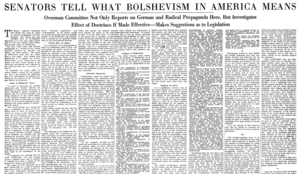
The Committee did little to demonstrate the extent of communist activity in the United States. In its analysis of what would happen if capitalism were overthrown and replaced by communism, it warned of widespread misery and hunger, the confiscation of and nationalization of all property, and the beginning of "a program of terror, fear, extermination, and destruction." Anti-Bolshevik public sentiment surged after release of the report and ensuing publicity.
German investigation
Johann Heinrich von BernstorffJohann Heinrich von Bernstorff
Johann Heinrich Graf von Bernstorff was a German politician and the ambassador to the United States and Mexico from 1908 to 1917.- Early life :...
, Karl Boy-Ed
Karl Boy-Ed
Karl Boy-Ed was naval attaché to German Ambassador to the United States Johann Heinrich von Bernstorff during World War I....
, Franz von Papen
Franz von Papen
Lieutenant-Colonel Franz Joseph Hermann Michael Maria von Papen zu Köningen was a German nobleman, Roman Catholic monarchist politician, General Staff officer, and diplomat, who served as Chancellor of Germany in 1932 and as Vice-Chancellor under Adolf Hitler in 1933–1934...
, Dr. Heinrich Albert
Heinrich Albert
Heinrich Friedrich Albert was a German lawyer who served as commercial attaché to the Imperial German Ambassador to the United States Johann Heinrich von Bernstorff during World War I. He was also the paymaster for German espionage and sabotage operations in the United States...
, and Franz von Rintelen
Franz von Rintelen
Captain Franz Dagobert Johannes von Rintelen was a German Naval Intelligence officer in the United States during World War I....
, among others, were Germans investigated for producing propaganda. All were previously evicted from the United States for being part of a German espionage
Espionage
Espionage or spying involves an individual obtaining information that is considered secret or confidential without the permission of the holder of the information. Espionage is inherently clandestine, lest the legitimate holder of the information change plans or take other countermeasures once it...
ring. The United States Brewers Association, the National German-American Alliance
National German-American Alliance
The National German-American Alliance, also called the NGAA or Deutschamerikanische Nationalbund, was founded in Philadelphia, Pennsylvania on October 6, 1901 by Charles J. Hexamer, who also served as its president until 1917. Operating as a federation of ethnic German associations, by 1914 the...
, and the Hamburg-American steamship line were investigated. The final report concluded that these organizations, through financial support, bribes, boycotts, and coercion
Coercion
Coercion is the practice of forcing another party to behave in an involuntary manner by use of threats or intimidation or some other form of pressure or force. In law, coercion is codified as the duress crime. Such actions are used as leverage, to force the victim to act in the desired way...
, sought to control the press, elections, and public opinion.
Bolshevism investigation
The report described the Communist system in Russia as "a reign of terror unparalleled in the history of modern civilization". It concluded that instituting MarxismMarxism
Marxism is an economic and sociopolitical worldview and method of socioeconomic inquiry that centers upon a materialist interpretation of history, a dialectical view of social change, and an analysis and critique of the development of capitalism. Marxism was pioneered in the early to mid 19th...
-Leninism
Leninism
In Marxist philosophy, Leninism is the body of political theory for the democratic organisation of a revolutionary vanguard party, and the achievement of a direct-democracy dictatorship of the proletariat, as political prelude to the establishment of socialism...
in the United States would result in "the destruction of life and property", the deprivation "of the right to participate in affairs of government", and the "further suppress[ion]" of a "substantial rural portion of the population." Furthermore, there would be an "opening of the doors of all prisons and penitentiaries". It would result in the "seizure and confiscation of the 22,896 newspapers and periodicals in the United States" and "complete control of all banking institutions and their assets". "One of the most appalling and far reaching consequences ... would be found in the confiscation and liquidation of ... life insurance companies." The report also criticized "the atheism that permeates the whole Russian dictatorship"; "they have denounced our religion and our God as 'lies'."
Despite the report's rhetoric and the headlines it produced, the report contained little evidence of communist propaganda in the United States or its effect on American labor.
Recommendations
The report's main recommendations included deporting alien radicals and enacting peacetime sedition laws. Other recommendations included strict regulation of the manufacture, distribution, and possession of high explosives; control and regulation of foreign language publications, and the creation of patriotic propaganda.Press reaction
The press reveled in the investigation and the final report, referring to the Russians as "assassins and madmen," "human scum," "crime mad," and "beasts." The occasional testimony by some who viewed the Russian Revolution favorably lacked the punch of its critics. One extended headline in February read:- Says Riffraff, Not the Toilers, Rule in Russia
- American Manager of Great American Plant There Tells Experiences to Senators
- Outsiders Seized Power
- Came Back from Other Countries and are Growing Rich at People's Expense
- Factories Being Ruined
- 60,000,000 Rubles Spent in Three Months at One Plant to Produce 400,000 Worth of Goods
And one day later:
- Bolshevism Bared by R.E. Simmons
- Former Agent in Russia of Commerce Department Concludes his Story to Senators
- Women are 'Nationalized'
- Official Decrees Reveal Depths of Degradation to Which They are Subjected by Reds
- Germans Profit by Chaos
- Factories and Mills are Closed and the Machinery Sold to Them for a Song
On the release of the final report, newspapers printed sensational articles with headlines in capital letters: "Red Peril Here", "Plan Bloody Revolution", and "Want Washington Government Overturned."
Criticism
Critics denounced the Committee as a "propaganda apparatus" to stoke anti-German and anti-Soviet fears, feeding the Red Scare and spreading misinformation about Soviet Russia.The Committee attracted criticism from the public for its perceived overreach, and especially for publishing the names of those accused of association with communist organizations. One woman from Kentucky wrote to Senator Overman on behalf of her sister, who had been accused by Archibald Stevenson, criticizing the Committee for its "brutal as well as stupid misuse of power" and "gross and cruel injustice to men and women the full peer in intellect, character and patriotism of any member of the United States Senate". The Committee was compared to "a witch hunt
Salem witch trials
The Salem witch trials were a series of hearings before county court trials to prosecute people accused of witchcraft in the counties of Essex, Suffolk, and Middlesex in colonial Massachusetts, between February 1692 and May 1693...
" in one exchange with a witness.
Aftermath
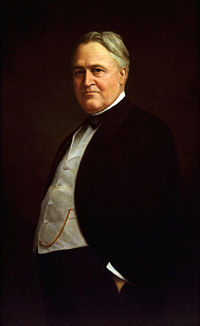
First Red Scare
In American history, the First Red Scare of 1919–1920 was marked by a widespread fear of Bolshevism and anarchism. Concerns over the effects of radical political agitation in American society and alleged spread in the American labor movement fueled the paranoia that defined the period.The First Red...
of 1919-20. Its investigations served as a blueprint for the Department of Justice
United States Department of Justice
The United States Department of Justice , is the United States federal executive department responsible for the enforcement of the law and administration of justice, equivalent to the justice or interior ministries of other countries.The Department is led by the Attorney General, who is nominated...
's anti-radical Palmer raids
Palmer Raids
The Palmer Raids were attempts by the United States Department of Justice to arrest and deport radical leftists, especially anarchists, from the United States. The raids and arrests occurred in November 1919 and January 1920 under the leadership of Attorney General A. Mitchell Palmer...
late in the year. These were led by Attorney General
Attorney General
In most common law jurisdictions, the attorney general, or attorney-general, is the main legal advisor to the government, and in some jurisdictions he or she may also have executive responsibility for law enforcement or responsibility for public prosecutions.The term is used to refer to any person...
Palmer, whose testimony about German brewers had been the catalyst for the Committee's creation.
On May 1, 1919, a month after the Committee's hearings ended, a bomb was mailed to Overman's home, one of a series of letter bombs sent to prominent Americans in the 1919 United States anarchist bombings
1919 United States anarchist bombings
The 1919 United States anarchist bombings were a series of bombings and attempted bombings carried out by anarchist followers of Luigi Galleani from April through June 1919...
. It was intercepted before it reached its target.
Later investigative committees
The Overman Committee was the first of many Congressional committees to investigate communism. In the aftermath of the Overman Committee's report, the New York State Legislature established the Lusk Committee, which operated from June 1919 to January 1920, Archibald E. Stevenson was its chief counsel and one of its witnesses. Unlike the Overman Committee, the Lusk Committee was active in raiding suspect organizations.The Overman Committee was an early forerunner of the better known House Un-American Activities Committee
House Un-American Activities Committee
The House Committee on Un-American Activities or House Un-American Activities Committee was an investigative committee of the United States House of Representatives. In 1969, the House changed the committee's name to "House Committee on Internal Security"...
, which was created 20 years later.
Primary sources
- United States Senate, Committee on the Judiciary. Brewing and Liquor Interests and German Propaganda: Hearings Before a Subcommittee of the Committee on the Judiciary, United States Senate, Sixty-fifth Congress, Second and Third Sessions, Pursuant to S. Res. 307. volume 1, volume 2. Govt. print. off., 1919. Original from the University of MichiganUniversity of MichiganThe University of Michigan is a public research university located in Ann Arbor, Michigan in the United States. It is the state's oldest university and the flagship campus of the University of Michigan...
.
External links
- Volume 1 and volume 2 of the Committee's hearings on the brewing industry and German propaganda, from the United States CongressUnited States CongressThe United States Congress is the bicameral legislature of the federal government of the United States, consisting of the Senate and the House of Representatives. The Congress meets in the United States Capitol in Washington, D.C....
via Google Books - volume 1 of the Committee's hearings on Bolshevik propaganda], from the United States CongressUnited States CongressThe United States Congress is the bicameral legislature of the federal government of the United States, consisting of the Senate and the House of Representatives. The Congress meets in the United States Capitol in Washington, D.C....
via Google Books - Excerpt from the Committee's Final Report. New York Times: "Senators Tell What Bolshevism in America Means," June 15, 1919, accessed February 24, 2010

